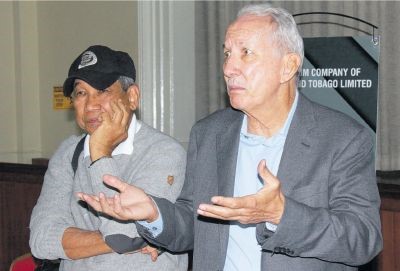(Trinidad Guardian) With $8 billion in losses in the past five years and a bullet payment of US$850 million due in 2019, Petrotrin chairman Wilfred Espinet says terminating its Refining and Marketing operations and retrenching 1700 permanent and casual employees was the only way to save the company after 100 years of operations in the industry.
In a media conference at the Pointe-A-Pierre Staff Club yesterday, Espinet said a commercial company cannot continue to operate at a loss indefinitely. He said under the current operation, Petrotrin’s value in terms of its balance sheet was deteriorating. Given the mandate by the Government to return the company to profitability, Espinet said the board of directors had to embark on a programme that would stop the deterioration so the company would be able to pay the debt it had accumulated.
Petrotrin has a $12 billion debt and owes Government more than $3 billion in taxes and royalties. The company requires a cash injection of $25 billion to refresh its infrastructure and to repay its debt, Espinet said, noting this money could not be funded initially and it was impossible to keep the refinery working.
In a release yesterday, the company said if left as is, the projected loss would be an estimated $2 billion per year. Espinet added that if the company does not find a solution to its bond payments in the coming weeks there will be an impact on its sovereign rating. He said the money being saved from shelving crude imports will help to repay the loan.
On being appointed, he said the board recruited experts to assess the performance capacity of the company’s assets and it was found that in comparison to other companies in the industry, Petrotrin ranked last.

He could not give a value of Petrotrin’s assets, as he said several were written down but they were intangible.
Further “bad investments” like the World Gas to Liquid Plant exacerbated the current problem, he said. Petrotrin produces 140,000 barrels of oil daily, of which 100,000 are imported crude. These imports require a lot of working capital and contribute to the loss.
“We had to take Petrotrin and redesign it from what it was and we put it into focused companies that would have an exploration and production end and a refinery and marketing unit. These two units were looked at and it was identified from very early that the refining and marketing were not going to survive because it was not profitable. It could not be made profitable, in fact,” Espinet said.
“We had a continued programme of looking at all sorts of ways to make this thing work. We came to the conclusion that if we wanted to be able to pay back the debt and if we wanted to be able to have a profitable company that could be sustained over time, we would have to take out what was the cancer of the operation and that would have been the refining and marketing.”
Noting that retrenchment would be an emotional process for the affected workers, he said the board met with the Government and looked at all options but there was no alternative. He said government accepted the board’s proposal and gave the go-ahead for the closure.
Espinet said this will be the course of action unless the Oilfield Workers’ Trade Union can come up with an alternative that is better than the closure. The OWTU has already presented its proposals to the company, which called for the creation of four entities: Land: North and East (LNE), Trinmar Offshore Operations, Exploration and Production and the Augustus Long Hospital.
OWTU leader Ancel Roget had warned that the refinery will be sold to private investors, but yesterday Espinet said, “There is no likelihood of that refinery being sold.”
Although aged, the refinery had had several upgrades in recent years. Among them is the construction of an Ultra Low Sulphur Diesel Plant, which Espinet said gave it value.
Board member Anthony Chan Tack said the refinery was unreliable and likened it to a taxi that was “more in the garage than on the road.”
No date was given for the restructuring exercise, as Espinet said they wanted to work with the union to determine the best way of retrenchment.
Approximately 2,600 permanent jobs will be affected as the company intends to redesign its Exploration and Production business, which will have approximately 800 workers.
Yesterday, the board met with the OWTU to discuss the company’s plan, which the union rejected.
In April, the company and the union signed a Memorandum of Agreement to establish a working committee to restructure Petrotrin. This included regular meetings, but none were held since the agreement was signed. Espinet explained yesterday that the company wanted to present the union with a workable plan, but all it had was a problem. He said they did not want to approach the union without a feasible course of action.
“We had a problem. We were not going to go to them with a problem. We were going to go to them with a solution. Coming to them with this, therefore, is to us, what the solution is,” Espinet said.
He said the company was asking the union to understand a situation which has a major impact on it and its members. He said the company now has to find an exit plan that makes it less difficult than if the workers were just being thrown on the pavement.









